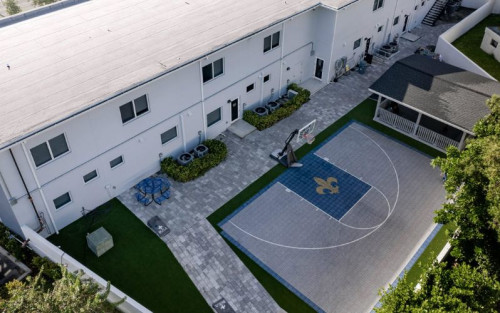

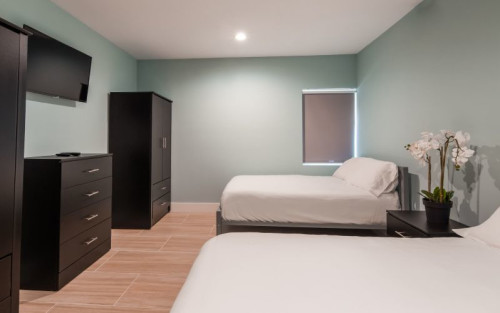

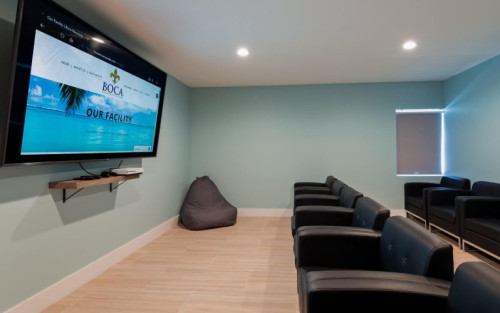




Boca Recovery Center Pompano Beach
Verified Center
This provider's information has been quality-checked by Recovery.com's Research Team for accuracy and completeness, including center verification through appropriate third-party organizations.
Treatment Focus
This center treats substance use disorders and co-occurring mental health conditions. Your treatment plan addresses each condition at once with personalized, compassionate care for comprehensive healing.
Primary Level of Care
Offering intensive care with 24/7 monitoring, residential treatment is typically 30 days and can cover multiple levels of care. Length can range from 14 to 90 days typically.
Treatment Focus
This center treats substance use disorders and co-occurring mental health conditions. Your treatment plan addresses each condition at once with personalized, compassionate care for comprehensive healing.
Primary Level of Care
Offering intensive care with 24/7 monitoring, residential treatment is typically 30 days and can cover multiple levels of care. Length can range from 14 to 90 days typically.
Provider's Policy
We are in-network with Ambetter, AmeriHealth Caritas Next, and Tricare. To ensure our patients receive the highest standard of care without the limitations often imposed by insurance restrictions, we also work with the majority of out-of-network insurance providers. Our team expertly navigates claims to help you maximize your benefits and minimize out-of-pocket costs
Boca Recovery Center Pompano Beach
Boca Recovery Center Pompano Beach
About Boca Recovery Center Pompano Beach
At Boca Recovery Center in Pompano Beach, people can slow down and focus on what comes next. This location provides medically supervised detox and residential care for those struggling with alcohol or drug use, along with co-occurring mental health concerns that often complicate recovery. Clients are given the space to stabilize, regain clarity, and start rebuilding without the distractions of everyday life.
Make Therapy Feel Real, Not Rigid
Treatment here is grounded in proven, evidence-based methods that help people understand how thoughts, feelings, and behaviors are connected. Rather than a rigid schedule, therapists will go for a walk with clients while talking through stressors, sit together in a quiet space, or check in weekly (or more if needed). This flexibility makes therapy feel practical and real.
Reduce Stress through Everyday Comforts
From fresh, chef-prepared meals and on-site fitness centers to spaces for relaxation like game rooms and movie theaters, the environment supports both physical and mental well-being. Simple conveniences, like an on-premise barber shop and wellness-focused amenities, help people maintain routine and self-care while in treatment.
Stay Engaged with Ongoing Guidance
A private alumni community, weekly Zoom meetings, and regular in-person events give people an easy way to stay connected long after discharge, starting as early as the day after leaving treatment. From quarterly gatherings and facility-led alumni groups to casual outings like picnics, sporting events, and paintball days, support continues in ways that feel natural. And each location has dedicated alumni representatives to keep people connected.

Highlights from the Center
Highlights
These highlights are provided by and paid for by the center.
Co-Occurring Disorders Treatment
Perfect for Professionals
Private Rooms Available
Addiction Recovery
Center Overview
Treatment Focus
This center treats substance use disorders and co-occurring mental health conditions. Your treatment plan addresses each condition at once with personalized, compassionate care for comprehensive healing.
Joint Commission Accredited
The Joint Commission accreditation is a voluntary, objective process that evaluates and accredits healthcare organizations (like treatment centers) based on performance standards designed to improve quality and safety for patients. To be accredited means the treatment center has been found to meet the Commission's standards for quality and safety in patient care.

Boca Recovery Center Pompano Beach
Insurance Accepted
Cash Pay Rates
Estimated Cash Pay Rate
Center pricing can vary based on program and length of stay. Contact the center for more information. Recovery.com strives for price transparency so you can make an informed decision.




Additional Boca Recovery Network Locations
Recovery.com Verified Listing
Recovery.com verified that the name, location, contact information and license to operate for this treatment provider are valid and up-to-date.
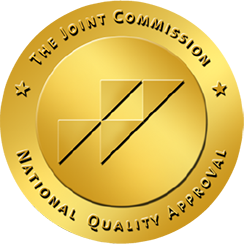
Joint Commission Accredited
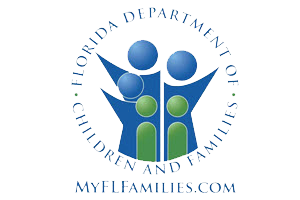
Licensed by Florida DCF
Recovery.com is an independent, third-party mental health resource. Verification does not imply endorsement and does not guarantee the quality of treatment services.
Meet Your Care Team

Dr. Alison Tarlow
Chief Clinical Director
Psy.D

Dexter Green
Lead Clinical Therapist
MA, MCAP

Reverend Charlotte Day
Clinical Therapist
CAP

Jake Powers
Housing and Facilities Supervisor

Benjamin "Bo" Garfield
Alumni Coordinator
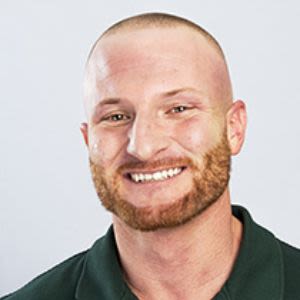
Aaron Langbein
Director of Business Development

Joseph Toland
Chief Operations Officer

Maryssa Lindsay
Lead Clinical Therapist, Safety Compliance Officer
Your Care Options
Specializations
Alcohol
Using alcohol as a coping mechanism, or drinking excessively throughout the week, signals an alcohol use disorder.
Detox
Detox fully and safely removes toxic substances from the body, allowing the next steps in treatment to begin with a clean slate.
Cocaine
Cocaine is a stimulant with euphoric effects. Agitation, muscle ticks, psychosis, and heart issues are common symptoms of cocaine abuse.
Family Therapy
Family therapy addresses group dynamics within a family system, with a focus on improving communication and interrupting unhealthy relationship patterns.
Heroin
Heroin is a highly addictive and illegal opioid. It can cause insomnia, collapsed veins, heart issues, and additional mental health issues.
Opioids
Opioids produce pain-relief and euphoria, which can lead to addiction. This class of drugs includes prescribed medication and the illegal drug heroin.
Professionals
Busy, high-ranking professionals get the personalized treatment they need with greater accommodations for work, privacy, and outside communication.
Veterans
Patients who completed active military duty receive specialized treatment focused on trauma, grief, loss, and finding a new work-life balance.
Who We Treat
Young Adults
Emerging adults ages 18-25 receive treatment catered to the unique challenges of early adulthood, like college, risky behaviors, and vocational struggles.
Men and Women
Men and women attend treatment for addiction in a co-ed setting, going to therapy groups together to share experiences, struggles, and successes.
Midlife Adults
For adults ages 40+, treatment shifts to focus on the unique challenges, blocks, and risk factors of their age group, and unites peers in a similar community.
Treatment Services
Detox
Detox fully and safely removes toxic substances from the body, allowing the next steps in treatment to begin with a clean slate.
Residential
In a residential rehab program, patients live onsite, with access to daily treatment and 24-hour care. An average stay is 30-90 days.
Approaches
Bio-Medical
A philosophy focusing on the biomechanics behind mental health disorders, using prescribed medications as a supplement to behavioral therapy.
Evidence-Based
A combination of scientifically rooted therapies and treatments make up evidence-based care, defined by their measured and proven results.
Individual Treatment
Individual care meets the needs of each patient, using personalized treatment to provide them the most relevant care and greatest chance of success.
Twelve Step
Incorporating spirituality, community, and responsibility, 12-Step philosophies prioritize the guidance of a Higher Power and a continuation of 12-Step practices.
Therapies
1-on-1 Counseling
Patient and therapist meet 1-on-1 to work through difficult emotions and behavioral challenges in a personal, private setting.
Art Therapy
Visual art invites patients to examine the emotions within their work, focusing on the process of creativity and its gentle therapeutic power.
Experiential Therapy
With this approach, patients heal by doing. Therapists help patients process difficult emotions to speak, using guided activities like art or dance.
Family Therapy
Family therapy addresses group dynamics within a family system, with a focus on improving communication and interrupting unhealthy relationship patterns.
Life Skills
Teaching life skills like cooking, cleaning, clear communication, and even basic math provides a strong foundation for continued recovery.
Motivational Interviewing and Enhancement Therapy (MET)
This approach is based on idea that motivation to change comes from within. Providers use a conversational framework that may help you commit to recovery.
Music Therapy
Singing, performing, and even listening to music can be therapeutic. Music therapy sessions are facilitated by certified counselors.
Psychoeducation
This method combines treatment with education, teaching patients about different paths toward recovery. This empowers them to make more effective decisions.
Conditions We Treat
Pornography Addiction
A person with a porn addiction is emotionally dependent on pornography to the point that it interferes with their daily life and relationships.
Schizophrenia
Schizophrenia is a serious mental health condition that causes hallucinations, delusions, and disordered thinking.
Personality Disorders
Personality disorders destabilize the way a person thinks, feels, and behaves. If untreated, they can undermine relationships and lead to severe distress.
ADHD, ADD
ADHD is a common mental health condition caused by dopamine imbalance. Common symptoms include inattention, hyperactivitiy, and impulsivity.
Anger
Although anger itself isn't a disorder, it can get out of hand. If this feeling interferes with your relationships and daily functioning, treatment can help.
Anxiety
Anxiety is a common mental health condition that can include excessive worry, panic attacks, physical tension, and increased blood pressure.
Bipolar
This mental health condition is characterized by extreme mood swings between depression, mania, and remission.
Burnout
Burnout entails mental and physical exhaustion, and leads to a severe lack of fulfillment. This condition is often caused by overwork.
Chronic Pain Management
Long-term physical pain can have an affect on mental health. Without support, it can also impact your daily life and even lead to addiction.
Substances We Treat
Alcohol
Using alcohol as a coping mechanism, or drinking excessively throughout the week, signals an alcohol use disorder.
Benzodiazepines
Benzodiazepines are prescribed to treat anxiety and sleep issues. They are highly habit forming, and their abuse can cause mood changes and poor judgement.
Chronic Relapse
Consistent relapse occurs repeatedly, after partial recovery from addiction. This condition requires long-term treatment.
Co-Occurring Disorders
A person with multiple mental health diagnoses, such as addiction and depression, has co-occurring disorders also called dual diagnosis.
Cocaine
Cocaine is a stimulant with euphoric effects. Agitation, muscle ticks, psychosis, and heart issues are common symptoms of cocaine abuse.
Drug Addiction
Drug addiction is the excessive and repetitive use of substances, despite harmful consequences to a person's life, health, and relationships.
Heroin
Heroin is a highly addictive and illegal opioid. It can cause insomnia, collapsed veins, heart issues, and additional mental health issues.
Methamphetamine
Methamphetamine, or meth, increases energy, agitation, and paranoia. Long-term use can result in severe physical and mental health issues.
Languages
Aftercare
Care Designed for Your Needs
Personal Amenities
Amenities
Special Considerations
Executive Program
Addiction and mental health treatment for executives typically involves high discretion, greater technology access, and more private, 1-on-1 care.
Gender-specific groups
Patients in gender-specific groups gain the opportunity to discuss challenges unique to their gender in a comfortable, safe setting conducive to healing.
Religion-Based Track
Patients can join faith-based recovery tracks to approach recovery with others in their faith, healing in a like-minded group with similar goals.
Activities
Off-Site Amenities

Learn More About the Center
Perceptions of Sobriety in Business
Discover what a new survey reveals about how choosing alcohol at business lunches actually shapes deals and the way colleagues and clients see people.
Drug Overdose Deaths by State
See how overdose death rates vary across the US—and which states are winning the fight.
Drug Safety at Music Festivals
Before the next live music event, learn the real trends, hidden risks, and smart safety practices around drugs and alcohol at music festivals.
Top Sober Friendly US Cities
Discover which US cities are truly embracing alcohol-free lifestyles.
What people are saying
Treatment
5.0
Accommodations
5.0
Food & Nutrition
5.0
Value
5.0
Pros
- Excellent & Effective Treatment Programming (5)
- Luxurious Accommodations (3)
- Gourmet & Nutritious Food (3)
- Treated With Respect (3)
Nicole I.
Treatment in 2021 • (30 days) • Reviewed 06/26/23
Former Client
•Veterinarian Technician
•Washington DC
Garrett H
Treatment in 2021 • (30 days) • Reviewed 04/21/22
Former Client
•Jacksonville
Anonymous
Treatment in 2020 • (30 days) • Reviewed 04/21/22
Former Client
•Nurse
•Pompano Beach
Anonymous
Treatment in 2020 • (30 days) • Reviewed 04/21/22
Former Client
•Nurse
•Pompano Beach
Merissa M.
Treatment in 2019 • (30 days) • Reviewed 04/14/22
Former Client
•Sales
•Fort Lauderdale, FL





